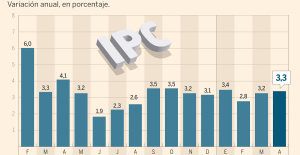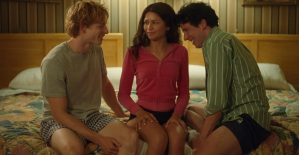Once, Klaus and Jutta are eating. A magnum of champagne is about to vomit across the table. Given the environment she was placed in, she is very understandable. Whereby the environment does not only mean the aesthetic one, the patterned wallpaper in need of explanation, the green-yellowish colors and the cashy light. But also the culinary environment. There are fish sticks on mashed potatoes.
We are in Hamburg. early eighties. Which would at least explain the wallpaper and the colors. However, what is happening on Klaus and Jutta's table, the contradiction between champagne and fish fingers, is the central rift that runs through the all-new German Amazon series called "Luden". And which tells of an axis time in St. Pauli, the largest brothel in Europe. And from the rise of Klaus Barkowsky, who initially pitched his camp in the toilet of a pretty fucked-up pub in St. Pauli, to the meanwhile Ludenkönig of Hamburg. And from his crash. When hard drugs came and the international mafia and AIDS. And tourism.
The rift runs between what Klaus dreams of and the misery he makes a reality. What Klaus dreams of – the “beautiful Klaus”, the “Lamborghini Klaus” that really exists, today he is seventy and an artist – is a world in which he turns dirt into glitter, in St. Pauli a gigantic version from Warhol's Studio 54. Where everyone meets, really everyone, the really big ones and the really greedy and the completely normal. And then party. Potentially infinite. "First class jumbo jet," says Klaus. And he talks about love all the time. Although he doesn't even know what that is. Otherwise he couldn't do what he's doing.
If you like, the rift that runs through St. Pauli in “Luden” is exactly the one that runs through the capitalist system – that between desire and delusion and reality. And Klaus, who installs a sex start-up based on exploitation and makes women dependent under false pretenses, is the CEO, so to speak, in his mercilessly charming characterlessness. He has the coldness, the Jesus-like, supple exterior, a sense of humor that can be confused with self-mockery and cordiality, the ability to turn even the worst dirt into gold.
That this malicious mixture of young Siegfried and Parsifal eventually believes that what he is selling is gold and glitter and not dirt, that there is no price to pay for the misery he causes, and that he is a big player is that he gets lobster when he'll never get past fish fingers.
Aaron Hilmer – born in Freiburg, became an actor in Hamburg with the “Pefferkorns” and was seen in Edward Berger’s Oscar film “Nothing New in the West” during the First World War – makes the dichotomy, the ambivalence of this dazzling pimp, this merciless upstart downright physically.
Now "Luden" is a true crime series according to the genre. But of course – and that in turn was the price of the fictionalization of this long-cold case from the Reeperbahn legend box – no one should expect the total educational film, the naked analysis of a male exploitation apparatus.
“Luden” is all of that and a contemporary history panorama (filmed from below, so to speak) of the early eighties. The production of the Munich Neuesuper (from which the wonderful Bavarian provincial satire "Hindafing" originates) keeps remarkably away from embellishment, from false romanticizing of what is happening, even if the six-part mini-series ends up being more like a dark fairy tale.
The narrators from Rafael Parente's team have an attitude towards what they are showing. But they don't carry it in front of them like a monstrance. They avoid moralizing like fools avoid real love. Again and again the pictures - they were shot at original locations, but not in Hamburg's Herbertstraße, but in Munich's Straße der Bavaria - oppose what they could actually show. Side with the dirt, not the glitter.
What you see in "Luden" is of course a man's story. To show anything else would also have been a lie. The Reeperbahn system was (and is) a male system. But the “Luden” Writers Room tells this story of the lost from the victim's perspective, so to speak. Creates a not always successful narrative balance between the pranksters and the women they do violence to and who sell their freedom and their bodies for money, who love men but get grubby guys.
At some point, Jutta, who is an addict who failed to make handsome Klaus her tool, staggers through the streets. “We thought,” says Jeanette Haim, who plays Jutta with crazy courage and uncompromising physical exertion, “we were St. Pauli because of the money. But what we were really looking for there was what everyone is looking for. attention, friendship, love. A family."
She says that they wanted to be seen, while people walk over her, who is lying on the ground on the hard pavement of St. Pauli. "We didn't want people to forget us. Because only those who are forgotten are really dead.”
This is pathos, of course. This is Puccini for the 21st century. But at least this goal, not to forget those whose lives were lost on the street of the lost called Reeperbahn, over which the bachelor parties are now tottering, is already achieved by the six-part series.
And if you still long for the eighties and a brothel after "Luden", there is no longer any help in this world.

 B:SM will break its investment record this year with 62 million euros
B:SM will break its investment record this year with 62 million euros War in Ukraine: when kyiv attacks Russia with inflatable balloons loaded with explosives
War in Ukraine: when kyiv attacks Russia with inflatable balloons loaded with explosives United States: divided on the question of presidential immunity, the Supreme Court offers respite to Trump
United States: divided on the question of presidential immunity, the Supreme Court offers respite to Trump Maurizio Molinari: “the Scurati affair, a European injury”
Maurizio Molinari: “the Scurati affair, a European injury” Inflation rises to 3.3% in April and core inflation moderates to 2.9%
Inflation rises to 3.3% in April and core inflation moderates to 2.9% Pedro Sánchez announces that he continues "with more strength" as president of the Government
Pedro Sánchez announces that he continues "with more strength" as president of the Government Irritable bowel syndrome: the effectiveness of low-carbohydrate diets is confirmed
Irritable bowel syndrome: the effectiveness of low-carbohydrate diets is confirmed Beware of the three main sources of poisoning in children
Beware of the three main sources of poisoning in children Relief at Bercy: Moody’s does not sanction France
Relief at Bercy: Moody’s does not sanction France More than 10 million holders, 100 billion euros: the Retirement Savings Plan is a hit
More than 10 million holders, 100 billion euros: the Retirement Savings Plan is a hit Paris 2024 Olympic Games: the extension of line 14 will open “at the end of June”, confirms Valérie Pécresse
Paris 2024 Olympic Games: the extension of line 14 will open “at the end of June”, confirms Valérie Pécresse Failing ventilators: Philips to pay $1.1 billion after complaints in the United States
Failing ventilators: Philips to pay $1.1 billion after complaints in the United States The Cannes Film Festival welcomes Omar Sy, Eva Green and Kore-Eda to its jury
The Cannes Film Festival welcomes Omar Sy, Eva Green and Kore-Eda to its jury Prisoner in Israel, a Palestinian receives the International Prize for Arab Fiction
Prisoner in Israel, a Palestinian receives the International Prize for Arab Fiction Harvey Weinstein, the former American producer hospitalized in New York
Harvey Weinstein, the former American producer hospitalized in New York New success for Zendaya, tops the North American box office with Challengers
New success for Zendaya, tops the North American box office with Challengers Skoda Kodiaq 2024: a 'beast' plug-in hybrid SUV
Skoda Kodiaq 2024: a 'beast' plug-in hybrid SUV Tesla launches a new Model Y with 600 km of autonomy at a "more accessible price"
Tesla launches a new Model Y with 600 km of autonomy at a "more accessible price" The 10 best-selling cars in March 2024 in Spain: sales fall due to Easter
The 10 best-selling cars in March 2024 in Spain: sales fall due to Easter A private jet company buys more than 100 flying cars
A private jet company buys more than 100 flying cars This is how housing prices have changed in Spain in the last decade
This is how housing prices have changed in Spain in the last decade The home mortgage firm drops 10% in January and interest soars to 3.46%
The home mortgage firm drops 10% in January and interest soars to 3.46% The jewel of the Rocío de Nagüeles urbanization: a dream villa in Marbella
The jewel of the Rocío de Nagüeles urbanization: a dream villa in Marbella Rental prices grow by 7.3% in February: where does it go up and where does it go down?
Rental prices grow by 7.3% in February: where does it go up and where does it go down? Europeans: a senior official on the National Rally list
Europeans: a senior official on the National Rally list Blockade of Sciences Po: the right denounces a “drift”, the government charges the rebels
Blockade of Sciences Po: the right denounces a “drift”, the government charges the rebels Even on a mission for NATO, the Charles-de-Gaulle remains under French control, Lecornu responds to Mélenchon
Even on a mission for NATO, the Charles-de-Gaulle remains under French control, Lecornu responds to Mélenchon “Deadly Europe”, “economic decline”, immigration… What to remember from Emmanuel Macron’s speech at the Sorbonne
“Deadly Europe”, “economic decline”, immigration… What to remember from Emmanuel Macron’s speech at the Sorbonne These French cities that will boycott the World Cup in Qatar
These French cities that will boycott the World Cup in Qatar NBA: young Thunder coach Mark Daigneault named coach of the year
NBA: young Thunder coach Mark Daigneault named coach of the year Athletics: Noah Lyles in legs in Bermuda
Athletics: Noah Lyles in legs in Bermuda Serie A: Dumfries celebrates Inter Milan title with humiliating sign towards Hernandez
Serie A: Dumfries celebrates Inter Milan title with humiliating sign towards Hernandez Tennis: no pity for Sorribes, Swiatek is in the quarterfinals in Madrid
Tennis: no pity for Sorribes, Swiatek is in the quarterfinals in Madrid

















